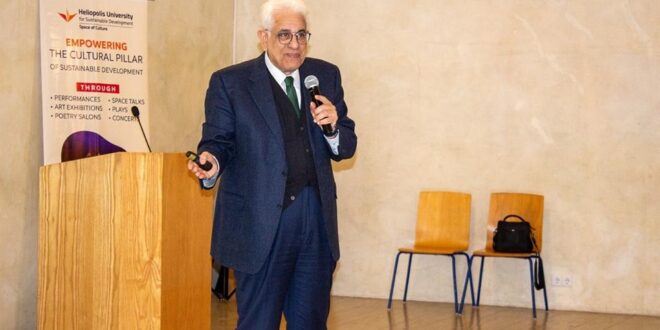Hossam Badrawi at Heliopolis University
At the invitation of Dr. Helmy Abouleish, President of Heliopolis University for Sustainable Development, Dr. Hossam Badrawi delivered an engaging lecture on Monday, February 17, 2025, under the title “How Do Universities Shape the Culture of Society?”
Dr. Badrawi began his visit by meeting with Dr. Helmy and a group of faculty members from Heliopolis University for Sustainable Development, where they highlighted various promising initiatives and projects led by the university. They also presented to Dr. Badrawi the student activities and programs designed to enhance their skills and capabilities, aiming to build well-rounded individuals who are more effective and influential in society. Additionally, they shared their vision and goals for the upcoming phase.
Dr. Badrawi expressed his admiration for the serious and inspiring efforts he witnessed, emphasizing the importance of cultural activities and sports as key factors in shaping students’ personalities. He also stressed the need for tools that allow students to evaluate their professors and vice versa.
Furthermore, he highlighted the importance of artificial intelligence and the necessity of mastering its use, stating that AI has become a reality that shapes our present and future.
The event then moved to the main lecture hall, where Dr. Helmy Abouleish introduced Dr. Badrawi to the students, expressing his joy in hosting him and providing the students with the opportunity to benefit from his exceptional knowledge and experience.
During his lecture, Dr. Badrawi discussed the true purpose of higher education and what society expects from it. He addressed the status of university students and how society views them as holding the highest level of education. He also challenged the narrow perception that higher education is merely a response to labor market demands, asserting instead that it is the driving force of development in any society, as it shapes the future.
He emphasized that universities must fulfill four essential objectives:
- Welfare – Universities contribute to society’s well-being by equipping students with knowledge and skills essential for progress and innovation.
- Social Order – Universities help create a harmonious society where different groups exchange knowledge, ensuring that science, technical skills, and expertise remain relevant and beneficial.
- Meaning – Universities examine established societal beliefs, explore different perspectives on both historical and contemporary issues, and redefine intellectual frameworks based on evolving ethical, philosophical, and aesthetic standards.
- Truth – Universities play a vital role in seeking truth by exploring the unknown and questioning humanity’s understanding of the surrounding universe. The goal is not just to dispel ignorance but to critically analyze our comprehension of the world.
He emphasized that modernization is the fundamental mission of universities in all societies.
During his lecture, Dr. Badrawi also discussed the concept of modernity, academic freedom, and institutional independence. He then delved into the role of culture in universities, emphasizing that universities serve as hubs of knowledge and creativity. Culture plays a pivotal role in shaping the identity of universities and fostering their academic and social environments.
The role of culture in universities is reflected in several key aspects, including:
- Enhancing critical and creative thinking.
- Preserving cultural identity and diversity.
- Shaping values and principles.
- Encouraging dialogue and social engagement.
Dr. Badrawi concluded his lecture with a powerful quote from Dr. Taha Hussein’s renowned book “The Future of Culture in Egypt”:
“A university is not merely a place where scholars are trained; rather, it cultivates enlightened and civilized individuals who do not settle for being merely educated but strive to be sources of knowledge. It is not enough for them to be civilized; they must also contribute to the advancement of civilization. If a university fails in either of these missions, it is unworthy of being called a university. Instead, it is merely one of many ordinary schools, and there are plenty of those. A university should serve as a beacon of enlightenment for its nation and humanity at large.”
Dr. Badrawi’s lecture was highly interactive, with participation from both faculty and students. The event concluded with warm applause from the audience, followed by a photo session where attendees gathered to capture memorable moments with Dr. Badrawi.
 Dr. Hossam Badrawi Official Website
Dr. Hossam Badrawi Official Website


